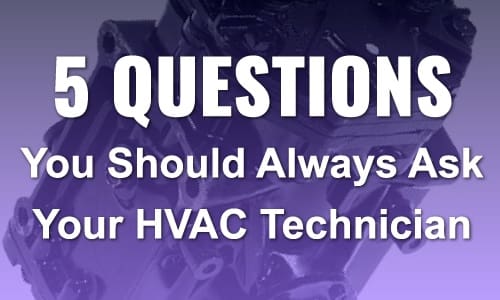Replacing or repairing an HVAC system can be a major investment for a business. Whether you intend to replace or repair your unit, finding out how you can make the most of it will ensure proper system functioning in the future.
Besides providing superior thermal comfort for employees and customers, having an HVAC system that operates at peak performance year-round will extend its service life, lead to significant energy savings, and even generate more business and profit.
Before an HVAC technician arrives at your location for a new system installation, routine maintenance, or an emergency repair, it’s a good idea to prepare a list of questions that address all of your concerns.
Listed below are five questions to ask your HVAC technician the next time you have a service appointment scheduled.
Q1: How often should I have my equipment inspected and maintained?
When it comes to commercial or industrial HVAC systems, the frequency of maintenance activities that should be done by professional HVAC technicians varies depending on the type of equipment, climate, facility-specific circumstances (e.g. size, design, purpose, occupancy rates, the activities commonly being performed, etc.), and even on the staff’s ability to complete basic maintenance tasks, such as changing air filters or cleaning outdoor condenser units. While most HVAC systems require bi-annual maintenance operations, components like air filters, evaporator coils, and condenser coils may need more frequent maintenance.
Q2: What are the warning signs of HVAC system failure?
If you don’t have a preventive maintenance plan in place, it’s critical to know the early symptoms of malfunctioning HVAC equipment so that you can take action before your system stops working. Unusual noises, water leaks, reduced cooling capacity, short cycling, poor ventilation, and increased energy bills are the first signs of HVAC failure.
Although these are some common problems that may occur in any HVAC system that is inadequately maintained, make sure that you require your technician to indicate any potential issues specific to your equipment and facility. Keeping an eye out for the first signs of failure will allow you to call in a technician who can diagnose and repair your HVAC unit before it fails completely.
Q3: What should I do if my HVAC compressor fails unexpectedly?
If your HVAC compressor stops working, and it’s still under warranty, we recommend that you shut down the entire system and contact the supplier. Continuing to operate your system in improper condition could cause extensive damage and void your warranty. If your warranty has expired, you should contact an HVAC technician who can inspect your system, diagnose the issue, and indicate whether repairing or replacing your compressor with a remanufactured unit is the best solution to your problem.
Q4: Are there any new technologies or upgrades that I should consider?
Technological advances move at a rapid pace in both HVAC and compressor industries. Your HVAC technician should be able to recommend the latest technologies that can make your system more energy efficient and also extend its service life. Although opting for new technologies might result in a higher initial cost, they can save you a lot of money in the long run. Thus, before selecting certain technologies, make sure that you discuss with your HVAC technician all the technological advances available for your system, without focusing solely on price.
Q5: Do you offer HVAC maintenance plans?
Whether you’ve just replaced or repaired your HVAC unit, regular maintenance is a key prerequisite for ensuring that your system stays in great condition throughout its service life. In addition to keeping your HVAC system running smoothly, preventing downtime, and reducing the potential for inconvenient and costly repairs, a comprehensive HVAC maintenance plan will give you peace of mind in knowing that your unit will be regularly maintained by an experienced and reliable professional.
The owners, managers, and operators of commercial, industrial and public buildings don’t have to familiarize themselves with the intricate ins and outs of HVAC systems. However, specific HVAC knowledge can help them keep their systems operating at peak performance, and even diagnose and fix issues by themselves. If you want to continue growing your knowledge on different HVAC-related topics, be sure to stay tuned for our next blog posts.












